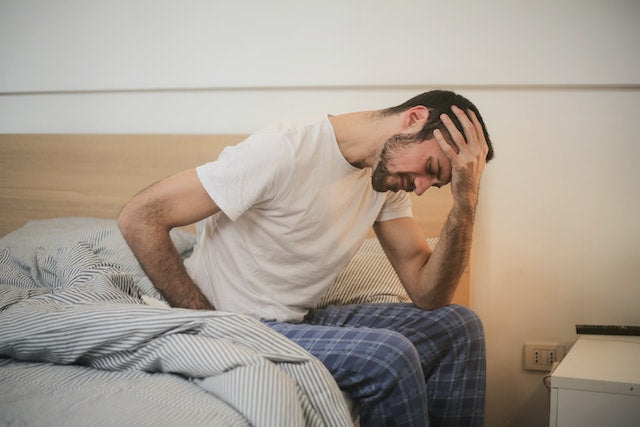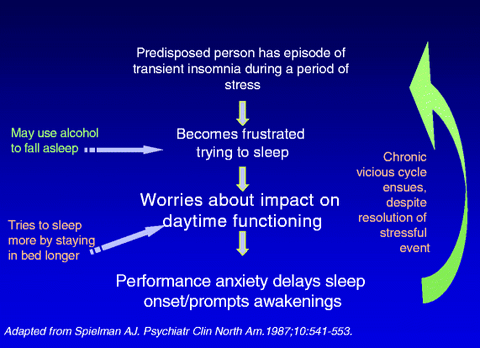If you find yourself staring at the ceiling late into the night when you should be sleeping, you’re not the only one lying awake (even if you feel like you are).
At least half of all adults report occasional insomnia, with 10 to 15 percent reporting chronic, ongoing insomnia..and simply counting sheep doesn’t help.
Insomnia is more common in women and older adults. In fact, 75 percent of adults ages 65 or older report insomnia symptoms, according to Healthline.
However, anyone can experience insomnia and it can wreak havoc on your life for days, weeks, or even months.
If left untreated, severe sleep deficits begin to interrupt your daily life. That means insomnia may cause your social life, personal relationships, and professional performance to dwindle.
The key to overcoming and treating insomnia is first to identify the type you suffer from – and there are more types than you think!
First off, determine whether you are experiencing primary or secondary insomnia.
Primary and Secondary Insomnia
Insomnia is sometimes caused by another lifestyle factor or condition. Other times, it is not.
Primary insomnia refers to an inability to sleep that you can’t link back to another cause. While the causes of primary insomnia are unknown, it is usually linked to jet lag, shift work, or temporary emotional distress caused by stressful life events.
Secondary insomnia, on the other hand, is the result of a pre-existing factor.

This includes a medical condition, psychological condition, or even the use of a prescription drug known to cause insomnia.
Substances like caffeine, tobacco, and alcohol are also known to contribute to secondary insomnia.
Moreover, a pre-existing sleep condition could be to blame. Narcolepsy and insomnia may not seem like two conditions that are opposite one another, for example.
On the surface, they are. Narcolepsy is a neurological condition that inhibits the brain’s ability to maintain control over natural sleep-wake cycles.
This causes people who suffer from narcolepsy to feel very sleepy during the day, sometimes causing them to fall asleep unwillingly in the middle of an activity.

While insomnia is technically the opposite of narcolepsy, narcolepsy and insomnia are often interlinked.
Many with narcolepsy experience insomnia in the form of interrupted sleep, waking up frequently throughout the night when they should be sleeping, yet falling asleep at undesired times during waking hours.
For those with narcolepsy, this nighttime insomnia is often due to vivid dreams, sleep paralysis, or even restless leg syndrome.
Whether your insomnia is primary or secondary, it may be either acute or chronic depending on how long it’s been affecting your sleep.
Acute Vs. Chronic Insomnia
The length of recurrent insomnia determines whether or not it is acute or chronic.
Acute insomnia, for example, explains short-term insomnia that typically lasts anywhere from several days to several weeks.
This type of insomnia is one of the most common and is sometimes called “adjustment insomnia.”
The name comes from the concept that this type of insomnia is usually caused by a stressful event, like a new job or a death in the family.
Other potential causes of acute insomnia include:
- Environmental factors like loud noises or bright lights
- Physical pain
- Illness or jet lag
- Sleeping in an unfamiliar or new place, like a hotel
Acute insomnia typically wraps up as the temporary sleep disturbances come to an end. For example, acute insomnia caused by moving to a new home clears up once you adjust to your surroundings.

Chronic insomnia, on the other hand, is long-term, disrupting sleep at least three days per week for four weeks minimum.
For chronic insomnia sufferers, the cause may be primary or secondary. For example, narcolepsy-related insomnia is typically both secondary and chronic.
Additional causes of chronic insomnia may also include:
- Acid reflux disease
- Chronic pain
- Sinus allergies or chronic congestion
- Psychological conditions, including depression or anxiety
- Sleep-onset insomnia, yet another type of insomnia
Sleep-onset insomnia describes insomnia caused by difficulty falling asleep at the beginning of the night.
Sleep-Onset Insomnia and Maintenance Insomnia
If you experience trouble falling asleep when it’s past your bedtime, sleep-onset insomnia might be the culprit.
For those with sleep-onset insomnia, it routinely takes 30 minutes or more to fall asleep. Sleep restriction therapy may help to improve this type of insomnia.
This involves spending less time in bed when you can’t sleep and trying another activity outside of the bedroom. Then, try to only spend time in bed for the duration for which you need to sleep.
For instance, if you’re lying in bed for nine hours but only sleeping for six, wait to get in bed until you’d naturally fall asleep, spending the extra three hours elsewhere in your home.
Maintenance insomnia, however, doesn’t relate to insomnia that occurs during the onset of sleep, but during the night.@somnifix Sleep-onset #insomnia explained! 💤 #greenscreen #greenscreenvideo #didyouknow #learnontiktok #sleep #sleepquality ♬ OOGA BOOGA! - Ski Mask The Slump God
This type of insomnia refers to people who may wake up more than once throughout the night, having a tough time falling back asleep even after spending 30 minutes in bed.
Maintenance insomnia also applies to people who may wake up too early, unable to fall back asleep.
These abnormal sleeping habits increase daytime grogginess, disrupting your quality of life.
Both may relate to psychophysiological insomnia, a term that describes insomnia caused by anxiety and worry about whether or not you can fall back asleep.
Psychophysiological Insomnia
Psychophysiological insomnia is a mouthful to say, but it can be compared to performance anxiety about whether or not you can fall or stay asleep.
Even if your insomnia isn’t chronic, you may lie awake worrying about the consequences of not getting enough sleep for a busy day ahead.
In chronic insomnia sufferers, psychophysiological insomnia may surround physical health conditions or long-term pain disrupting your sleep and life.
Sometimes, it starts as acute insomnia triggered by stress and then morphs into a long-term issue that’s tough to break out of.
This anxiety surrounding bedtime causes the brain to associate going to bed with stress and worry rather than relaxation and rest.
As a result, a burst of alertness and anxiousness follows as soon as you lay down.
If you feel fearful about being unable to sleep often or find yourself feeling extremely alert at night, you may suffer from this type of insomnia.
Moreover, those with psychophysiological insomnia may struggle to fall asleep when they intend to, but find themselves dozing off when they don’t desire to, like when watching television.
Regardless of the type of insomnia you suffer from, consistently poor sleep quality can quickly become life-threatening.
The treatment options for your type of insomnia may vary, but there are many general rules of thumb for beating fragmented sleep and sleep deprivation.
Overcome Insomnia by Building Healthy Sleep Hygiene
Treatment for your insomnia depends on the type you suffer from and whether or not any underlying conditions are responsible.
That said, if an underlying chronic health problem or medication isn’t to blame, lifestyle and behavioral changes can help you beat insomnia over time.
If you climb into bed only to overthink yourself into another sleepless night, self-soothing habits like meditation, light stretching, or breathwork can help you build a calming routine around sleep.

These activities are known to activate the parasympathetic nervous system, taking the body out of fight or flight and preparing you for rest and relaxation.
Try a hot shower or bath, too. A hot shower before bed is proven to assist in the onset of sleep by helping your body temperature drop afterward, easing you into sleep.
Sleeping with the TV on not only creates unnecessary stimulus that activates the brain before bed – the blue light can also trick the body into thinking it’s daytime when it’s actually night.
Steer clear of electronics several hours from bedtime to avoid brain overactivity and blue light emissions associated with them.
Avoid caffeine, alcohol, and tobacco known to stimulate the brain and fragment the natural sleep cycle.

What’s more, keep a consistent sleep and wake time even on the weekends to help regulate your circadian rhythm, which tells your body when to wake up and when to wind down for sleep.
Address other disruptions like street lights with blackout curtains or an eye mask. If you snore or your partner snores, block it out with mouth tape before bed.
Mute Snoring With Mouth Tape
If you snore, your body is unable to properly oxygenate itself while you rest. If left untreated, you may even develop a sleep disorder (such as sleep apnea) caused by overactive snoring.
When your partner snores, the irritating sound causes you to kick them in their sleep, leading to bigger issues than a restless night! No matter who snores in your bedroom, nasal breathing is the solution.

Open-mouth snoring is caused by airway tissues that vibrate together when you mouth breathe as you rest.
Nasal breathing, however, promotes a proper tongue posture that makes mouth breathing virtually impossible. As a result, open-mouth snoring stops in its tracks.
Moreover, nasal breathing leads to the promotion of nitric oxide, a vasodilator known to reduce stress, boost immunity, and improve oxygenation, keeping you in a relaxed state all night long.
But how do you nasal breathe and prevent the mouth from falling open if you’re asleep? Mouth tape.
Before you reach for just any tape you have lying around the house, be warned that the adhesives in most household tapes contain harmful chemicals known to irritate the skin and cause rashes.

SomniFix, however, is perfect for even the most sensitive skin. Our Mouth Strips are made from recycled materials and feature a hypoallergenic, gel-like adhesive that won’t break you out.
Furthermore, our Mouth Strips offer a breathing vent in the center that allows for emergency mouth breathing if you happen to become chronically congested overnight.
Pop a SomniFix Mouth Strip on before you drift off, and you’ll experience calming nasal breathing all night long – no snoring included!
You’ll wake up on the right side of the bed, well-rested and ready to face whatever the day throws your way.
Stare at the back of your eyelids rather than the ceiling with the help of SomniFix tonight!





